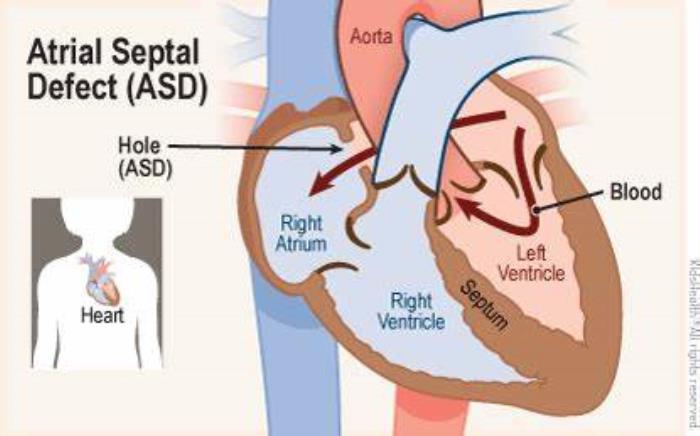Atrial Septal Defect (ASD) is a congenital heart condition that can have lasting effects on heart and lung health, even after surgical or catheter-based closure. Long-term monitoring is crucial for ensuring that the heart continues to function properly and that any potential complications are detected early. Regular follow-ups with a cardiologist, combined with diagnostic tests and lifestyle adjustments, are essential to safeguard the long-term health of ASD patients.
Medical disclaimer: This content is for general awareness and does not replace a doctor’s consultation. For diagnosis or treatment decisions, consult a qualified specialist.
The Impact of Atrial Septal Defect on Long-Term Heart Health
ASD can lead to increased blood flow to the lungs and strain on the right side of the heart. Over time, untreated or improperly managed ASDs may result in complications such as pulmonary hypertension, arrhythmias, or even heart failure. Even after successful closure, some residual effects, like an enlarged heart or altered blood flow patterns, may persist, making ongoing monitoring essential for early intervention.
Monitoring Heart Function After ASD Closure Surgery
Post-closure care focuses on ensuring the heart adapts well to the corrected blood flow. Monitoring includes assessing the heart’s structural and functional changes, such as the reduction of chamber enlargement or improved blood oxygen levels. Regular check-ups help identify rare but possible complications, like device malfunctions or residual leaks, which can impact overall recovery and health.

The Role of Regular Echocardiograms in Post-ASD Care
Echocardiograms are a cornerstone of post-ASD monitoring, providing detailed images of the heart’s structure and function. These non-invasive tests help track the success of the closure, detect any residual shunting, and assess right heart size and pulmonary artery pressures. Regular echocardiograms ensure that the heart remains in good condition and help guide treatment if issues arise.
Tracking Pulmonary Hypertension Risks in ASD Patients
Pulmonary hypertension is a serious concern in ASD patients, especially those diagnosed later in life or with prolonged exposure to abnormal blood flow. Monitoring pulmonary artery pressures is vital to prevent long-term damage to the lungs and heart. Advanced imaging and diagnostic tests can help track subtle changes and inform timely interventions.
Early Detection of Arrhythmias and Other Heart Complications
Arrhythmias are a common long-term concern for ASD patients, particularly as they age. Early detection of irregular heart rhythms, such as atrial fibrillation, can prevent severe complications like stroke. Regular electrocardiograms (ECGs) and wearable heart monitors are effective tools for identifying and managing arrhythmias promptly.
Lifestyle Factors That Influence Long-Term Health in ASD Patients
Healthy lifestyle choices play a significant role in the long-term well-being of ASD patients. Maintaining a balanced diet, engaging in regular physical activity, and avoiding smoking or excessive alcohol consumption can help reduce the risk of cardiovascular complications. Stress management and adherence to prescribed medications further support optimal heart health and recovery after ASD closure.
Managing Exercise and Physical Activity for Optimal Heart Health
Regular exercise plays a crucial role in maintaining heart health, especially for patients who have undergone Atrial Septal Defect (ASD) closure. Activities should be tailored to individual capabilities and monitored by a cardiologist to avoid overexertion, particularly in cases with residual defects or pulmonary hypertension.
Importance of Cardiologist Follow-Ups: How Often Should You Go?
Consistent follow-ups with a cardiologist are essential for ASD patients to monitor heart function, detect complications, and adjust treatment plans. Most patients require annual check-ups, though frequency may vary based on individual health status and the presence of comorbidities.
The Role of Blood Pressure Monitoring in ASD Management
Blood pressure monitoring is a key aspect of long-term ASD management, as hypertension can strain the heart and exacerbate complications. Regular monitoring helps ensure that any abnormalities are promptly addressed.

Advances in Wearable Technology for Heart Health Monitoring
Wearable devices equipped with ECG, heart rate monitoring, and oxygen saturation tracking provide ASD patients with real-time data on their heart health. These technologies empower patients and healthcare providers to detect early signs of complications.
Pediatric ASD Patients: Special Considerations for Monitoring Growth
Children with ASD require close monitoring of growth and development to ensure that their condition does not hinder physical or cognitive progress. Regular evaluations by a pediatric cardiologist and a multidisciplinary team are essential.
Transitioning from Pediatric to Adult Cardiology Care for ASD Patients
As pediatric ASD patients grow older, transitioning to adult cardiology care is vital to address age-specific concerns, such as the risk of arrhythmias or heart failure. A structured transition plan ensures continuity of care and optimal health outcomes.
Psychological Well-being and Its Connection to Long-Term Health
ASD patients may experience anxiety or depression related to their condition. Addressing psychological well-being through counseling and support groups can significantly improve their overall quality of life and long-term health.
Managing Comorbidities in ASD Patients Over Time
Comorbidities such as pulmonary hypertension, arrhythmias, or heart failure require integrated care and regular monitoring. Managing these conditions is critical to ensuring long-term stability and reducing the risk of complications.
The Role of Diet in Maintaining Heart Health After ASD Closure
A heart-healthy diet rich in fruits, vegetables, whole grains, and lean proteins supports cardiovascular health. Avoiding excessive salt, sugar, and saturated fats helps prevent hypertension and other heart-related issues.
Recognizing Warning Signs: When to Seek Medical Attention
Patients should be vigilant for symptoms such as shortness of breath, fatigue, palpitations, or chest pain. These could indicate complications like residual defects, arrhythmias, or pulmonary hypertension and warrant immediate medical evaluation.
Understanding the Risks of Reopening or Residual Defects
Although rare, reopening of the defect or residual shunting can occur. Regular follow-ups with echocardiograms and other imaging tests are crucial to identify and address these issues promptly.
Advances in Research for Long-Term Care in ASD Patients
Research continues to improve the understanding of ASD management, focusing on innovative closure devices, better imaging technologies, and strategies for preventing late complications, ensuring better outcomes for patients.
Advances in ASD Closure Surgery: What Patients Should Know
Stay informed with the latest advances in ASD closure surgery. This article highlights the most recent technological and surgical innovations in ASD treatment, providing patients with a comprehensive understanding of their options and how these advances improve recovery and outcomes.
The Impact of ASD on Heart Function and Overall Health
Understand how ASD affects heart function and overall health. Atrial Septal Defect can have significant effects on heart performance and general well-being if left untreated. This article discusses the consequences of ASD on heart function and the importance of timely treatment to prevent long-term health issues.
Conclusion: Prioritizing Long-Term Monitoring for a Healthier Future
Long-term monitoring is essential for maintaining optimal heart health in ASD patients. With regular follow-ups, lifestyle modifications, and advances in technology, patients can enjoy a healthier, active life while minimizing risks.
Best ASD Closure Surgery in India
The Best ASD Closure Surgery in India is a procedure designed to close a hole in the heart’s atrial septum, improving blood flow and overall cardiac health in patients with atrial septal defects.
Best ASD Closure Surgery Hospitals in India
The best asd closure surgery hospitals in india provide advanced facilities and specialized cardiac teams, ensuring comprehensive care from initial assessment to post-surgical recovery.
ASD Closure Surgery Cost in India
The asd closure surgery cost in india is affordable and transparent, offering patients high-quality care and a range of options to suit their needs.
Best ASD Closure Surgeons in India
The Best ASD Closure Surgeons in India are experts in congenital heart procedures, providing personalized care and a high success rate for patients with atrial septal defects.
FAQ
Why is long-term monitoring essential for ASD patients?
Long-term monitoring helps detect complications like residual defects, arrhythmias, or pulmonary hypertension, ensuring timely interventions and better outcomes.
How often should ASD patients have follow-up echocardiograms?
Follow-up frequency varies but typically involves annual echocardiograms or as recommended by the cardiologist based on individual health conditions.
Can wearable technology help in monitoring heart health?
Yes, wearable devices can track heart rate, ECG, and oxygen saturation, providing valuable insights and early warnings for potential complications.
What are common complications detected in long-term ASD monitoring?
Common complications include residual defects, arrhythmias, pulmonary hypertension, and heart failure. Regular check-ups are vital for early detection.
Is lifestyle modification necessary for patients with resolved ASD?
Yes, maintaining a heart-healthy lifestyle, including proper diet and regular exercise, is essential to support long-term cardiovascular health.
Explore the Best Heart Care Resources in India
Find some of the top cardiologist, surgeons and the best heart hospitals in India
Best Heart Hospitals in India
Choosing the right hospital is crucial for successful heart treatments. If you want to explore trusted options, check the list of Best Heart Hospitals in India offering world-class facilities, advanced cardiac care units, and experienced teams for both simple and complex procedures.
Best Cardiologists in India
Finding the right cardiologist can make a huge difference in early diagnosis and long-term heart health. If you are looking for the Best Cardiologists in India, see this curated list of experts who specialize in preventive care, interventional cardiology, and complex heart disease management. Check the full list Best Cardiologists in India.
Best Cardiac Surgeons in India
If you are planning for heart surgery and need top-level expertise, we recommend exploring the Best Cardiac Surgeons in India. These surgeons have a proven record in performing bypass surgeries, valve replacements, and minimally invasive heart operations with excellent outcomes.
Get more indepth information on Cardiology treatments and their costs.
Conclusion
Your cardiology health deserve the best care. Explore the links above to learn more about the top cardiac hospitals and cardiac surgeons in India.
Discover the best hospitals in India for ASD closure surgery, including top choices, advanced techniques, and cost-effective options. Best ASD Closure Surgery Hospitals in India
Atrial Septal Defect (ASD) closure surgery, while generally safe, carries certain risks and potential complications. These include abnormal heart rhythms (arrhythmias), enlarged heart, heart failure, high pressure in the lungs (pulmonary hypertension), shortness of breath, and stroke. Minimally invasive procedures using catheters can also have complications such as device displacement, embolism, and hemodynamic disturbances. It's important to discuss these risks with your healthcare provider to make an informed decision. Risks and Complications Associated with ASD Closure Surgery
While medications cannot repair an atrial septal defect (ASD), they can help manage symptoms and prevent complications. Commonly prescribed medications include beta blockers to control irregular heartbeats, anticoagulants (blood thinners) to reduce the risk of blood clots, and diuretics to reduce fluid buildup in the lungs and other parts of the body. These medications help alleviate symptoms and improve the patient's quality of life while monitoring the condition. The Role of Medications in Managing ASD Symptoms